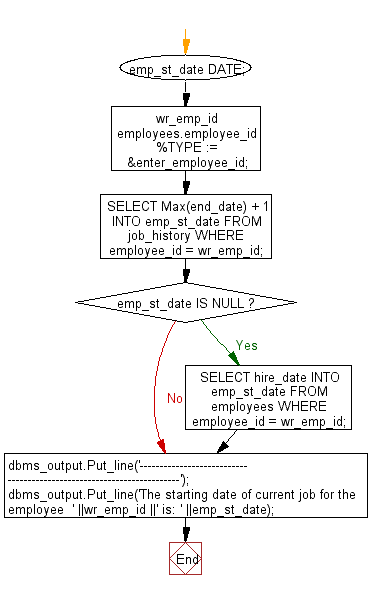PL/SQL Cursor Exercises: Find out the start date for current job of a specific employee
PL/SQL Cursor: Exercise-40 with Solution
Write a PL/SQL block to find out the start date for current job of a specific employee.
Sample Solution:
Table: employees
employee_id integer first_name varchar(25) last_name varchar(25) email archar(25) phone_number varchar(15) hire_date date job_id varchar(25) salary integer commission_pct decimal(5,2) manager_id integer department_id integerTable: job_history
employee_id integer start_date date end_date date job_id varchar(25) department_id integer
PL/SQL Code:
DECLARE
emp_st_date DATE;
wr_emp_id employees.employee_id%TYPE := &enter_employee_id;
BEGIN
SELECT Max(end_date) + 1
INTO emp_st_date
FROM job_history
WHERE employee_id = wr_emp_id;
IF emp_st_date IS NULL THEN
SELECT hire_date
INTO emp_st_date
FROM employees
WHERE employee_id = wr_emp_id;
END IF;
dbms_output.Put_line('----------------------------------------------------------------------');
dbms_output.Put_line('The starting date of current job for the employee '
||wr_emp_id
||' is: '
||emp_st_date);
END;
/
Sample Output:
SQL> / Enter value for enter_employee_id: 189 old 3: wr_emp_id employees.employee_id%TYPE := &enter_employee_id; new 3: wr_emp_id employees.employee_id%TYPE := 189; ---------------------------------------------------------------------- The starting date of current job for the employee 189 is: 13-AUG-05 PL/SQL procedure successfully completed.
Flowchart:

Go to:
PREV : Write a PL/SQL block to display the last name of manager, and their departments for a particular city, using parameters with a default value in explicit cursor.
NEXT : Write a PL/SQL block to display the last name, first name and overpaid amount by adding formal parameters and specify a default values for the added parameters
Improve this sample solution and post your code through Disqus
What is the difficulty level of this exercise?
